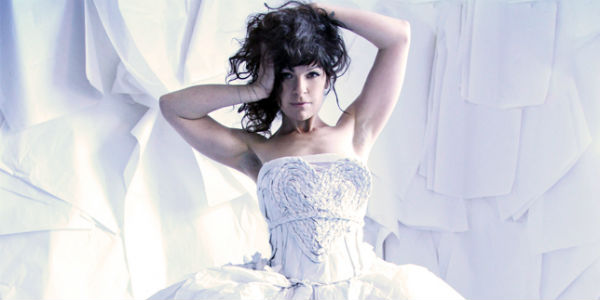Jesca Hoop @ Komedia, Brighton 15.04.14
Given she could easily have filled a bigger space, Bearded bowls up to the tiny Komedia bar wondering why Jesca Hoop has chosen to play here. But it all makes sense within a few songs of a set offering a virtuoso display of low-key intimate gorgeousness.
Apr 15th, 2014 at Komedia, Brighton / By Norman Miller
 Much of the set features tracks from her latest album Undress, which features pared-back acoustic re-imaginings of tracks from past albums like Hunting My Dress. On the record, Hoop duets with the likes of Elbow's Guy Garvey and Sam Beam from Iron & Wine but tonight she's all alone – or “on her tod” as she says at one point in the midst of some audience banter about the joys of the English language.
Much of the set features tracks from her latest album Undress, which features pared-back acoustic re-imaginings of tracks from past albums like Hunting My Dress. On the record, Hoop duets with the likes of Elbow's Guy Garvey and Sam Beam from Iron & Wine but tonight she's all alone – or “on her tod” as she says at one point in the midst of some audience banter about the joys of the English language.And the joys of language are something Jesca Hoop revels in. As the set unfolds, we’re thankful that not only does she have a stunning voice, effortlessly swooping from husky depths to spine-tingling contralto, but she sings with crystalline clarity that lets every bewitching line shine through.
Bearded cannot think of any contemporary songwriter who comes close to Hoop’s lyrical genius at combining sharp observation, poetic wonder and genuine emotional clout – Joni Mitchell, Dylan or Patti Smith in their respective pomps perhaps. Or maybe Hoop's wise early mentor Tom Waits, who memorably said of her: “She is an old soul, like a black pearl, a good witch, or a red moon. Her music is like going swimming in a lake at night”. Little wonder, Hoop's website prints her lyrics – read 'em.
The set is of such even-handed beauty it seems almost churlish to pick out any highlights. ‘Murder of Birds’ and ‘Born To’ are masterpieces of swooping vocal dynamism, while ‘Whispering Light’ and ‘DNR’ resonate through each chord and line. ‘Hospital’ and ‘Angel Mom’ are heart-rending classics edged with steely purpose.
‘Four Dreams’ and ‘City Bird’ offers a few more sprightly musical motifs to counterpoint the air of gentle melancholy which bears up Hoop's wry observation near the end that the more she sings on her own, the sadder the songs seem to get. But by the end no-one's sad at all – we've all been enchanted by a philosopher chanteuse.





 All Content RSS Feed
All Content RSS Feed
Follow Bearded on...